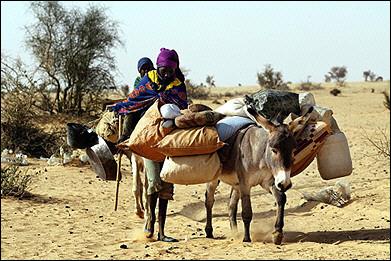
NEW YORK/DAKAR/N’DJAMENA, 26 June 2023– Children and families who have arrived in Eastern Chad in search of safety after fleeing the intensifying conflict in the neighbouring Sudanese region of Darfur, now face new needs and challenges as they seek refuge in provinces of Chad that are already some of the most deprived.
As of 23 June, more than 140,000 Sudanese refugees and 34,000 Chadian returnees have crossed the border – over 90% of them women and children – and thousands more are expected to arrive as violence escalates in Darfur.
The refugees who arrive share stories of running away from burnt-down villages, civilians being attacked and killed, some as they try to make the crossing into Chad.
Many are injured or have lost loved ones, and several children have lost track of their families while fleeing.
“The horror children and families are experiencing in Sudan is quickly spiralling into a serious crisis in Chad”, said Jacques Boyer, UNICEF Representative in Chad.
“We are running out of resources to provide assistance to children and families arriving while increasingly fearing that this humanitarian emergency could break a very fragile cohesion across borders.”
The majority of refugees arrive in Chad through 27 entry points along the border, in the provinces of Ouaddai, Sila and Wadi Fira.
In these places, the levels of deprivation are among the highest in the country.
Access to essential services such as water, shelter, health and education is extremely limited, and now communities are having additional pressure to share very scarce resources.
As trade with Sudan has been completely suspended, the prices of food and commodities have also gone up substantially.
Since the beginning of the crisis, UNICEF has succeeded in:
- Building boreholes for refugees and host communities to ensure access to safe water, providing home water treatment and delivering hygiene promotion messages to help avoid waterborne diseases.
- Setting up child-friendly spaces to provide safe spaces for children, provide psychosocial support, and identify and reunite separated and unaccompanied children with their families.
- Prepositioning essential medicine, vaccines and nutrition supplies to the health centres in the villages hosting refugees.
- Sensitizing refugees and host communities on essential family practices, social cohesion and prevention of sexual exploitation and abuse.
As needs continue to increase, UNICEF and partners have reviewed initial planning from 100,000 to 310,000 refugees and returnees expected to arrive by December 2023.
More than half have already fled from Sudan to Chad by mid-June. As the rains start in Chad, access to the affected provinces will be significantly cut off and immediate scale-up of the response is urgently needed.
“This crisis is escalating by the day, and we need help quickly to limit the effects of the humanitarian disaster that is unfolding before our very eyes,” said Boyer.
Out of the US$25 million needed to respond to the crisis, UNICEF Chad has so far succeeded in mobilizing 10 per cent (US$2.5 million.)

